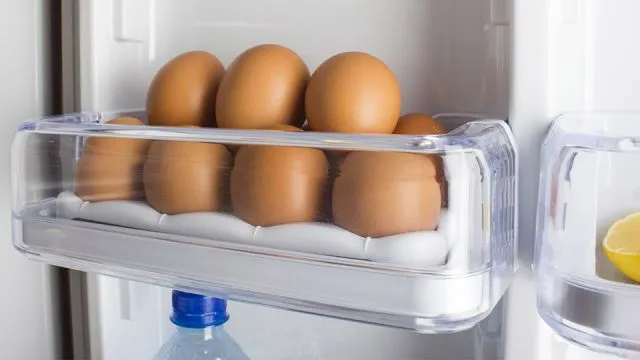
- Share on Facebook86
- Share on Pinterest
- Share on Twitter
Did you know that where you store your eggs in the refrigerator could mean a difference of eating a fresh egg versus one that could potentially make you ill? In fact, all foods have an ideal spot in the fridge for storage. Adhering to some simple storage rules assures your food will stay fresh longer.
Here’s the worst place to put your eggs in the fridge
Your fridge may come with a specific egg compartment tucked into the door, but it’s not ideal for storing eggs. Why? Because the doors of a refrigerator are the warmest areas of the fridge and should be reserved for foods that are most resistant to spoiling. Storing eggs in the door of the fridge exposes them to fluctuating temperatures each time the door is opened and closed throughout the day.
In fact, after bringing your eggs home from the supermarket, it’s very important to refrigerate them at a temperature of 45 degrees Fahrenheit or below, suggests Eggs Safety Center. Not doing so can lead to bacteria growth and rotten eggs. So, provided that the temperature in your fridge is set correctly, the best place to store your eggs is in the coldest part of the fridge, which is the main body or lower shelves. This ensures your eggs will maintain a consistent and cool temperature throughout the day, according to eggs.ca.
How long do eggs last in the refrigerator?
Proper storage means your eggs will last three to five weeks. Even if the sell-by date has expired during that time, your eggs will be perfectly safe to use. Provided, of course, that you’ve stored them correctly and at the right temperature. Liquid egg products, on the other hand, should be consumed within two to six days from the date of purchase and stored in the refrigerator at all times. Once opened, though, liquid egg products should be used immediately. Here are a few other tips:
- Fresh eggs should be used by the best before date, or up to five weeks.
- Leftover yolks or whites should be used within two to four days.
- Hard-boiled eggs should be eaten within one week.
- Prepared egg dishes should be eaten within three to four days.
Eggs should be stored in their original carton
Most people like to throw away the egg carton when they get home from the supermarket, opting instead to store eggs in the nifty little egg caddy that comes with the fridge. Sure, it looks pretty, but experts recommend always storing your eggs in their original carton. Egg cartons protect the eggs from cracking and also prevent the thousands of tiny pores in the shell from absorbing strong odors and flavors from other foods in the fridge.
Furthermore, eggs should always be stored with the large end up. That’s how they’re packaged in the carton. By doing so, the yolk will remain center. Does that really matter? I’m not that picky. But sometimes off-center yolks create a very thin spot in the egg white, making it harder to pop out the yolk for deviled egg recipes.
Here’s what else should never be stored in the doors
Milk should not be stored on the door shelves. Keep milk at the back and on the bottom shelf, where the fridge is coldest. If you want your milk to stay fresh longer, opt for organic milk that’s antibiotic-free and hormone-free. Organic milk is processed differently to preserve shelf life. It needs to stay fresh longer because organic products often travel farther to reach store shelves, since it is not produced throughout the country. The process that gives the milk a longer shelf life is called ultrahigh temperature (UHT) processing or treatment. Milk is heated to 280 degrees Fahrenheit for two to four seconds, killing all bacteria.
In addition, the butter compartment on the fridge doors is not the best place to store butter, since opening and closing the doors causes temperature fluctuation. The best place to store your butter is toward the back of the fridge where the temperature is consistently cold. Other foods that should never be stored in the fridge door include fresh juice, cream, opened pet food and leftovers.
So, what are those doors good for?
Instead of storing perishables in the doors, use the door shelves to store condiments and other foods that can stand up to temperature fluctuations, like mayo, ketchup, mustard, relish, bottled water, soda and juice (not fresh).
More storage tips
The upper shelves of the fridge are most consistent in temperature, and the lower shelves are the coldest. So, place foods such as hummus, olives and deli meats that don’t require cooking near the top of the fridge. Also, store nuts in the fridge or freezer — not in the cupboard! Nut oils can get rancid quickly in warmer temps. Herbs are also great for the upper shelves. Simply wash and then store the same way you store flowers. Add a little fresh water in a glass-jar and stand the herbs upright. Or, add a dampened paper towel to a container and add the herbs.
Food is expensive! Americans lose on average 40 percent of their food from farm to fork, according to Natural Resources Defense Council. So, the better you store your food, the longer it will last. And the longer it lasts, the more money you save! Most importantly, you won’t risk making you or your family ill from rotting food.
— Katherine Marko
- Share on Facebook86
- Share on Pinterest
- Share on Twitter

